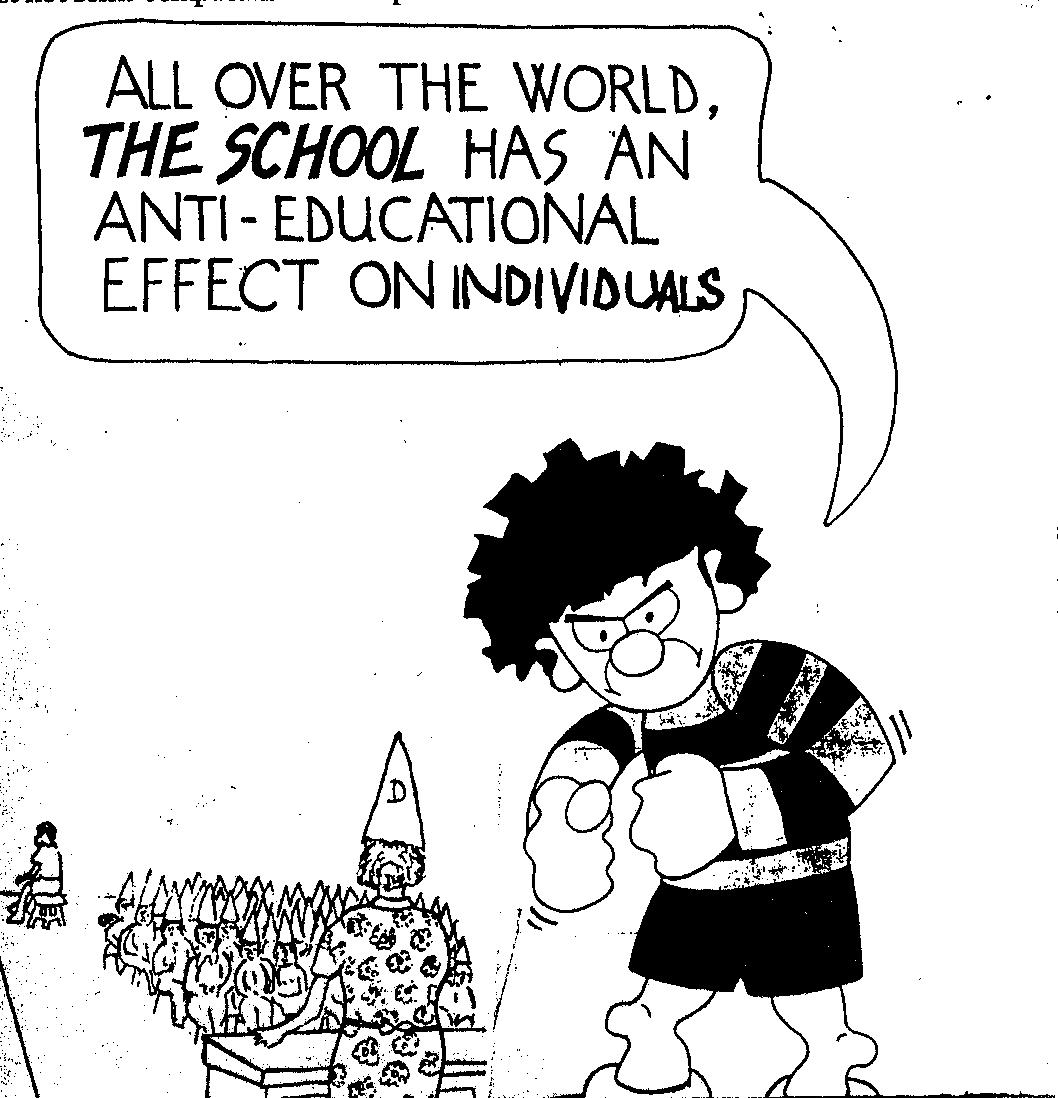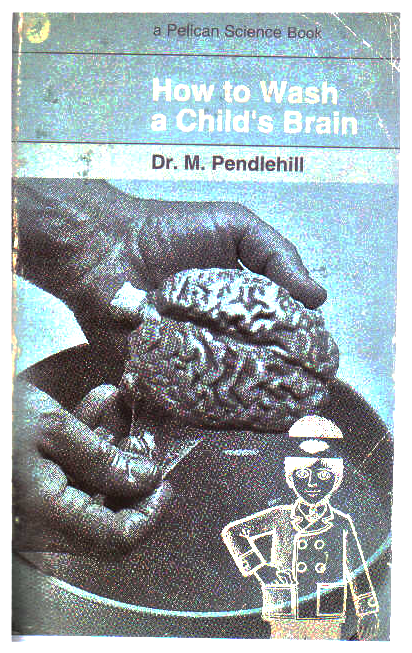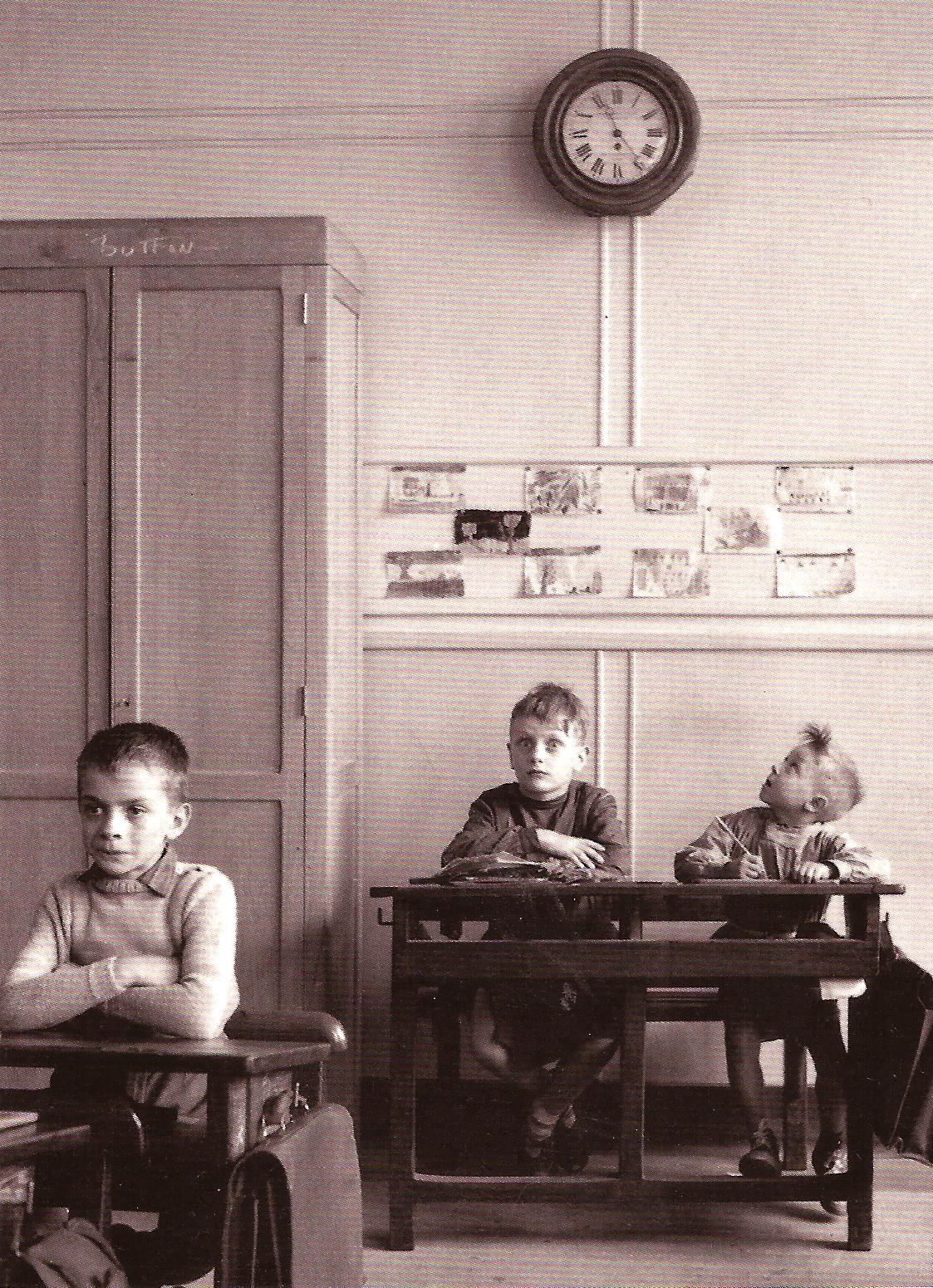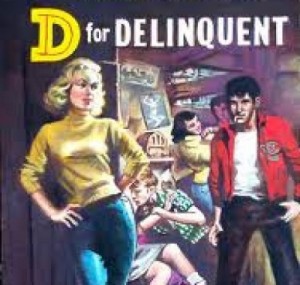
. . . the school for the oppressed is a revolution . . .
Those of us who are parents obviously want the best for our kids. But in a world where madness and money madness dominate, what is this “best”? Despite ourselves, most of us in some way accept the dominant underlying threat of this society (called “realism”) which says that if your kids don’t get a “good education” they’ll sink. So parents are generally forced to become unpaid cops – pushing their kids into school.
In 1912, during the Great Unrest – the most combatative period of the English working class before the First World War, schoolkids as young as 8 went on a fairly widespread strike against homework and corporal punishment. It was their mothers who forced them back into school. Probably it wasn’t just their dream of their children’s social mobility (which at that time was most associated with developing their kid’s literacy) that made them act like that, but also their need for the school as a means of childcare, which, far more so nowadays, is one of the few ways many parents can get some consistent rest from their kids. The intensified isolation this society is imposing like never before is exemplified by the lack of communal childcare, and, above all, lack of communal space for kids like the streets (which certainly wasn’t the case in 1912). And the dream of a good future for our kids, in this society’s terms – through the fantasy of a secure career, intensifies this isolation between the kids themselves – intensifies their separate competitive rat-race egos as against their more human qualities, their directly playful, rebellious and communicative qualities. And it intensifies their illusions about what this “good future” really holds, just as mothers just before the First World War had illusions about their kids’ future.
Some working class parents want their kids to be in that top 25% who’ll make it (at least for some of the time). They know that it’ll alienate them even more from their kids, but what else is new? Some may even seriously think of their kids as an investment in their future (just as business and the State think of kids), someone to look after them in their old age, to ‘profit’ them later on as compensation for all the sacrifices they’ve made for them. More usually, this investment mentality is not so crude: often parents project onto their kids their own thwarted ambitions, pushing the kids into becoming the successes they failed to become. Despite the kids’ resistance to the endless slog, this kind of parent assures them that “You’ll thank me in the end”, hoping to achieve by proxy some consolation for their own lack of achievement, such achievement being defined by a society which inevitably produces far more disappointed, often gravely demoralised and crushed, failures than it does successes.
A more sympathetic variation of this is the parent who, when young, was naughty at school and later rejected the middle-class career road to ‘success’ in an epoch when the class struggle tended to expose some of the bullshit and vapidity of these well-spoken professionals. The repression of struggle, especially since the miners’ defeat, has meant an unprecedented and accelerating imposition of submission, passivity and social control onto the vast majority: opposing this terror seems, for most, doomed to extremely humiliating failure (yet not opposing it will mean a far worse humiliation in the long term, even if less immediately risky, less scary in the here and now). This forced retreat has resulted in increasingly marginalised struggle coinciding with the more and more uncontested domination of more and more nooks and crannies of life by the insane pseudo-logic of the market and its roles and ideologies. And the less we find ways of opposing it the insaner we become: the stress of normality is driving people up the wall. And this show of normality, with its reassuring gloss that claims that all sane questions are being publicly discussed, tries to make any critical sense seem mad and completely unrealistic, a whimsical fantasy, at best.
As a result, there are many who previously took loads of risks against this world yet feel that it’s all come to nothing and that, even if they are inevitably marginalised, at least their kids should somehow be able to ‘make it’. In an epoch dominated by money terrorism, they increasingly fear for their kids’ future should they end up in an impoverished rut like them, and so push them to have middle class ambitions which they previously rejected with disgust. The enormous tensions of working class life, not to mention the prohibitive cost of tutorial fees and loans, make the chance of a cushy career pure fantasy for most kids of working class families; however, it’s a fantasy their parents often believe in, so adding to their kids’ stress with the pressure of unrealisable proxy aspirations. It’s a fantasy that hasn’t kept up with the times, a mirage that evaporates before your very eyes as soon as you approach it a bit closely.
The chances of kids from working class backgrounds rising to the top 25% is now far less than it was 25, or even 12, years ago. The result of current education policy insures that, by and large, money goes to money, and that even the good kids from poor backgrounds will become ‘good’ (i.e. fearfully servile) and poorly paid workers. When the visionary David Blunkett as Minister of Education talked of creating a “highly skilled, highly adaptable” workforce out of today’s kids, it’s obvious he never meant highly paid: the skills required to operate computers are already becoming as banal as the ‘skills’ needed to read machine instructions on a factory floor. As for “adaptable workforce”, read “flexible working”: try to forget yourself and become one of those machines ready to be turned on at any time of the day or night, anytime of the week, month or year, functioning at the speed and whim of “market forces” pressing your buttons. I even heard of one capitalist ideologue enthusing on the radio about the potential joys of the 24-hour society being eventually extended to schoolkids, who’d be “allowed” to study at anytime. We should remember, before dismissing such insane abstractions as impossible, that so many of today’s policies – e.g. the privatisation and breaking up of the water industry and of the railways – were regarded as ridiculous insane abstractions 18 years ago. Ideology and madness (and ideology is just collectively organised madness), once ignored and/or resigned to, become concrete practical realities.
As for those who “make it”, it will be mainly, though certainly not exclusively, those with the contacts, and with the cynicism, contempt and self-contempt necessary to play the roles required in such a back-stabbing grovelling environment. Nowadays, it’s not, generally speaking, intrinsic abilities developed over years of hard perseverance that those at the top reward but rather, the ability to manipulate people with hype and an exchange of favours. The corny adage,“It’s not what you know but who you know” is increasingly the case. Since it’s the kids from rich backgrounds who have the most high-up contacts, the vast majority of the top future 25% will come from the present top 25%.
Of course, capitalism does need some element of social mobility. For one thing, it needs to maintain the democratic myth that says, “You can be what you want to be if you really set your mind to it” (an ideology of equal opportunity that has undoubtedly been the cause of countless nervous breakdowns and even suicides by many of those possessed by it: if you can’t “be” what you set your mind to – the lot of the vast majority – then it’s obviously your fault, loser!). Hence the vast exaggerated publicity given to the few who do make it (take your pick from pop stars to politicians via TV chefs, artists, footballers and top hairdressers). Secondly, social mobility is needed to inject some “new blood” and new angles on reality, especially in the culture and ideology industries, to rejuvenate what would otherwise remain a stagnant and increasingly unconnected and irrelevant presentation of reality. I suspect that the lack of this “new blood” is one of the reasons for the utterly shallow nature of the vast majority of the particularly puerile crap being churned out of Hollywood nowadays, which wasn’t exclusively the case in the 70s because there were social climbers who had some genuinely interesting past histories; but today such a closed club can only appear to innovate itself by increasingly dazzling spectacular computer generated techniques (which has the added advantage of reducing the numbers of extras they would normally have to pay). A few of the poor are needed to rise in order to inform various capitalists enterprises of the subtle variations in the contradictions they are (or have been) forced to live in so that these miseries can be given the appearance – but not the reality – of being addressed by those in positions of power, especially those in the media industry (Michael Moore in the States comes to mind)*.
Those who rise used to be called class traitors. Certainly they’re informers: their ability to represent criticism of misery without ever involving themselves in any real movement for change betrays their working class roots. Charlie Chaplin, despite his fame being unconnected to a very different period of social upheaval (also a period of increased social mobility – from the 50s to the 80s), is in some ways still a good example of some significant aspects of the last 90 years. His upbringing was brutally destitute: poverty drove his sister completely mad. Yet in the early 50s he could bow down to the recently crowned Queen as she honoured him (sure, under pressure from the American ruling class at the time, he never got knighted, but that’s just a political detail). After all, he was a shining example to all poor kids of the way out of the ghetto, perhaps the first significant global role model of the spectacle of hope for the desperate. Such an utterly compromised betrayal of class anger was rightly attacked by the more radical sections of a fairly obscure movement of anti-artists known as the Lettrists, who disrupted Chaplin’s press conference at the Paris Ritz; though this is the kind of shining inspiration really worth emulating, social relations have become so totalitarian and brutal that to do this kind of thing nowadays would probably result in you getting a good kicking and maybe a jail sentence (at least, if it were to take place at the London Ritz).
And since Chaplin, in the 60s we had, for example, those social climbers, the Beatles, who received the MBE from that other social climber, Harold Wilson, as a reward for, in Wilson’s words, “keeping the kids off the streets”. Then in the 70s, punk elevated loads of formerly working class kids into the spectacle of rebellion, eventually making it into banal conformity (e.g McLaren getting over £100,000 for advertising Barclays Bank) with the occasional donning of some pseudo-rebellious mask borrowed from their pseudo-rebellious past. Since then, despite the temporary rise of the yuppy, social mobility has largely declined: certainly it was greater in the first 80 years of the 20th century than more recently. Nowadays, probably, for every one person who rises there are 9 who remain in the ever-worsening shit. And current education policy, described as “social eugenics” in one report, will reduce such mobility even further.
Most of us would settle for our kids not being in the bottom 25% (in fact, we’d probably push for them not to be in that bottom 25%, that is, insofar as we can make any difference). What is this “realism”, given the fact that the bottom 25% are used as threatening examples of what will happen if you fall behind in the rat race for the middle 50%, who are already, with large unequal variations in survival differences, often scrabbling over each other not to sink? (the pecking order on the global Titanic has never been so scrabbling). What is this “realism” given the future we anticipate for our kids (realistically, capitalism could very well, and even irreversibly, destroy much of the planet, leaving the surviving remnants of humanity subject to a market misery and social control that makes “1984” seem even more crude and archaic than it already does)? What is this “realism”, given the fact that most people feel impotent in the face of such fundamentals? What is this “realism” given the fact that….(fill in the contradiction of your choice).

Most of us parents probably disliked school (and some of us still uselessly fantasise about getting revenge for some humiliation we suffered but failed to combat) and yet, if we are to play the “Good Parent” we’re meant to push our kids into “getting a good education”, which basically means bit by bit reducing our kids only to those qualities needed to sell their labour and to not rebel. In fact, underlying this responsible parent role is the fact that we’re forced, by the law, by school-parent contracts, by the anti-truancy laws, by the threat of fines and naming and shaming in the media, and even prison, and having our kids taken into care, to push our kids into making the best of a bad situation, which is seen as making sure that they become good boys and girls. This is the underlying threat posed by Morality: be good and you shall reap the benefits of a Ph.D. (a carrot held up for all but only grasped by a small minority); be bad and you’ll reap welfare to work benefits, or the benefit of a spell inside.
And yet we strive to have our own “morality” – in opposition to the dominant hypocritical one – and somehow beyond good and evil. But how?
– Soweto schoolkid rioters, 1976.
Note: Most of the above was written in June 1998, but little bits have been added to it since.
P.S.The 6th March 2003 saw the tentative beginnings of schoolkids opposing the futureless world that awaits them, in the form of walkouts from school in the U.S., U.K., Australia and elsewhere against the impending war on Iraq. In London this took the form of rattling the gates outside Downing Street and punch-ups with the cops.See Schoolkids and the Iraqi War to connect to text on scholkids movement during the war
The following is a leaflet written by the author of the above, handed out at the Anarchist Bookfair October 1997:
– Soweto schoolkid rioters, 1976.
A meeting to discuss the possibilities of a radical intervention in schools will be held at Brownswood Road Library, London N4 on Saturday 25th October, 2p.m. onwards. There’ll be a creche. Bring refreshments, some ideas, facts and experiences. You’re also welcome to bring along written notes to hand out as well. Welcome to all those prepared to analyse and criticise everything related to kids’ present education and future lives from the point of view that unless a significant revolutionary class movement develops over the next generation there’ll be no worthwhile future to look forward to.
In one of his pre-election broadcasts, Blair stated, “For me, education reform is what Trade Union reform was for Margaret Thatcher”, adding a bit later, and with a psychotically menacing leer, “David Blunkett’s going to give them homework, oh yes – lots of homework”. Just as the crushing of the community of resistance to work (absenteeism, wildcat strikes, sabotage, go-slows, etc.) – under the guise of Trade Union reform – was vital for the ruling class to develop intensified productivity and competitiveness and assert their social control, so, in the guise of “Education Reform” New Labour hope to crush what remains of the community of childhood – by inculcating a work ethic in which every child has to ruthlessly compete with one another in order to make it in this jungle of winners and losers. We are a long way from the recognition of the above quoted Soweto schoolkids. 75% of kids will be losers, but “Education, Education, Education” will insure that they blame thmeselves (and that their parents blame them) in the same proportion as they absorb the dominant ideology of commodity production, exchange and, above all, total immersion in their own separate careeer-based role. It’s no surprise that suicide is second only to road accidents (and then only just) as a cause of death amongst teenagers. But whilst there’s some oppostion to the car economy, there’s no real opposition so far to “Education”. The attempt to eradicate all sense of self other than that which is saleable in the economy, and of all sense of community other than that based on submissison to the rules of the economy (and which is central to the imposition of “morality” onto kids) is at the heart of this suicidal apocalypse. Within this market-imposed “realism” kids are meant to get their sense of (exchange) value by the approval of their behaviour and work by a highly stressed and badly paid ideological cop. Sure, there are lots of teachers who have supported the riots of their pupils: after a kids’ riot at a Battersea school a teacher told me, “The kids were doing what all of us teachers wanted but were too scared to do” Nevertheless, their role, what they are paid to do, is to train kids in submission to external authority, to police (much of the immediate content of what’s learnt being not that important and often quickly forgotten). There’s probably going to be an increasing struggle in the education world, though much of it will probably be a struggle over false choices (e.g. between the less traditional liberals and the technocratic “modernisers”), though not all of it will be that simple (e.g. the recent riot in a school in Canterbury). The Left look like they could dominate this opposition. How can we contribute to these future struggles and open them up beyond the standard leftist response?
Within this overall perspective, the following subjects should probably be touched on at the meeting:
The new schools/parents contracts; anti-truancy laws and curfews.
Ofsted: a critique of ‘standards’; the insufficiency of the 70s libertarian socialist critique of “standards”: a look at William Tynsdale school; a look at what’s happening in Hackney.
The function of League Tables.
Analysis of the form and content of the National Curriculum and a critique of exams.
The breakdown of the community of childhood (e.g. sexual molestation, heavy bullying, etc. – always experienced amongst the bourgeoisie at public school, now increasingly amongst working class and mixed working class/middle class schools).
How does computer fetishism and the introduction of the Internet effect schools?
How the State wants to make primary schools more and more subject to the same pressures of secondary schools, unlike when we were kids. Our own experience of school and how have things changed since we were kids.
Some history: the co-opting of working class self-education in the 19th century into State education. The anti-homework and anti-corporal punishment strikes of kids in 1912 here; the Schools Action Union strikes of the early 70s; the pro-miners school strikes in 1984; the Sheffield schools demos of 1985; the successful 2 month long schools occupation movement in Greece, 1991 against anti-truancy laws; other schoolkids movements (e.g. in the 80s in Pakistan or Burma, I think, there was a movement for “the right to cheat” – i.e. the right to do exams collectively and with their parents’ help). The history of teacher’s struggles and where have they converged with schoolkids’ struggles. A look at small riots in schools in favour of sacked teachers (e.g. Battersea, about 3 years ago, and Canterbury a few months ago).
The following contradictions and perspectives could also be looked at : The contradictions of being a “Good Parent”: what the State means by that and what we mean (most parents disliked school and yet, if they are to play the Good Parent, they’re meant to push their kids into “getting a good education”). What is the market-defined “realism” of helping our kids’ future, given the future of ecological collapse and totalitarian social control we anticipate? What does supporting and protecting our kids mean if we’re forced to subject them to the torture of homework from the age of 7? How does homework effect kids from different social backgrounds (e.g. differences in space available, available resources and the time and energy parents have to help their kids).
Although this has been initiated by me, I have vast areas of ignorance and probably the same goes for you. The whole project has to be seen as mutual self-education, and, hopefully, a critique in practice of formal education which never educates to think critically and non-hierarchically. We have to feel that anlaysing, that theory, that creating a spark of recognition in writing and talking, which makes people feel that it’s worth arguing and fighting, creates some meaning to our lives; that there’s some point in struggling against the stultifying atmosphere of indifference in this country. The best projects are those that subvert ourselves, our fixed ideas and fixed practice, as well as subverting this world. And given Blair’s and Blunkett’s project of mass ideological intensification, subverting education could prove more subversive than we imagine.

2005 Note:
Apart from the incomplete analysis of what it means to be a good parent and of social mobility in the text above (Education, Stupefication , Commodification) and some analysis of the effect of computers and computer ideology on kids (“The Thought Of A Thoughtless World”), the above list of possible critiques have not been developed. Anyone wishing to contribute to such a project can contact me.
See also Schoolkids And The Iraq War about kids walking out of school against the war on Iraq . And school stopper’s handbook (1984/5).
See also this, on the students and secondary school students movements in the UK 2010: “Hope against hope”.
*See ‘Moore Is Less’ for a look at Moore and his film ‘Fahrenheit 9/11’








Leave a Reply